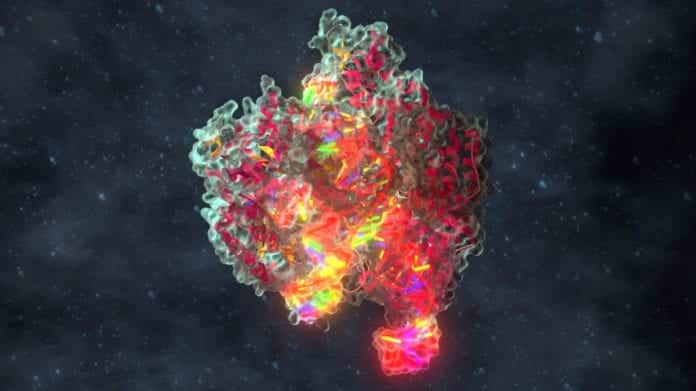First CRISPR-Cas9 Blocking Small Molecule Identified
In a recent discovery, the first small-molecule inhibitor of the Streptococcus pyogenes Cas9 (SpCas9) protein has been identified by scientists that can enable more precise control over CRISPR-Cas9-based genome editing.
The investigators screened a selection of small molecules to identify substances which disrupt the binding of SpCas9 to DNA and thereby interfere with its ability to cut DNA by creating a package of high-throughput cell-based and biochemical assays. These first inhibitors enter cells and are much smaller compared to the previously discovered anti-CRISPR proteins. The substances that are new allow for reversible and dose-dependent constraint including its applications for foundation editing gene editing, and epigenetic editing in mammalian cells.
SpCas9 has been designed as a gene therapy agent for muscular dystrophy, eyesight disorders, HIV, and other hereditary ailments. But these programs could greatly benefit from precise control over timing and the dosage of activity that is SpCas9 to lesser consequences. Assessing these facets of SpCas9 activity may also benefit other programs, like effectively editing the DNA of model organisms to model and study disease, and the use of chemical pushes in genetically engineered mosquitoes technology mosquitoes to suppress the spread of malaria and other
mosquito-borne ailments.The need for temporal and dose control of SpCas9 has produced a requirement for anti-CRISPR molecules. Although exist, they are big and impermeable to cells, irreversible inactivity can be consumed by proteases, and may pose the risk of adverse immune reactions within the body. By contrast, small-molecule inhibitors are reversible safe, and generally non-immunogenic and can be delivered to cells via passive diffusion. In addition, they may be synthesized on a large scale at a low price with small batch-to-batch variability.
In the new study, Senior Author – Amit Choudhary of the Broad Institute, Harvard Medical School, and Brigham and Women’s Hospital and his staff introduced a strong platform for its cost-efficient and rapid identification and validation of inhibitors of SpCas9. Measuring CRISPR-Cas9 activity was challenging due to the properties of this enzyme that is SpCas9. Choudhary and colleagues created high-throughput primary and secondary assays for SpCas9-DNA binding and SpCas9 DNA-cutting action. For the primary assay, they used a technique known as fluorescence polarization to track the interaction between also a DNA segment along with SpCas9 containing PAM sequences. In the assay, automated microscopy to quantify changes was used by them.
The researchers screened agent members of multiple classes of atoms to recognize the class whose members inhibited SpCas9. The team found two compounds that interrupt the capability of SpCas9 and inhibit SpCas9-mediated DNA cleavage in a dose-dependent manner in mammalian cells. Since they obstruct DNA binding by the enzyme, these molecules are secure in human plasma, and also inhibit catalytically-impaired technology of SpCas9, such as those for activation.
“These results lay the foundation for precise chemical control over CRISPR-Cas9 actions, allowing the secure use of such technologies,” Choudhary says. “But, these molecules are not prepared for applications in humans and not tested for efficacy in cattle.”
In future studies, the researchers aim to recognize the inhibitors’ binding sites on the SpCas9:gRNA complex, analyze their mechanism of action and optimize their effectiveness. They will determine whether the molecules interact with goals in cells and evaluate their specificity toward other CRISPR-associated nucleases. The findings of the study were published in Journal Cell on 2nd May 2019.






























